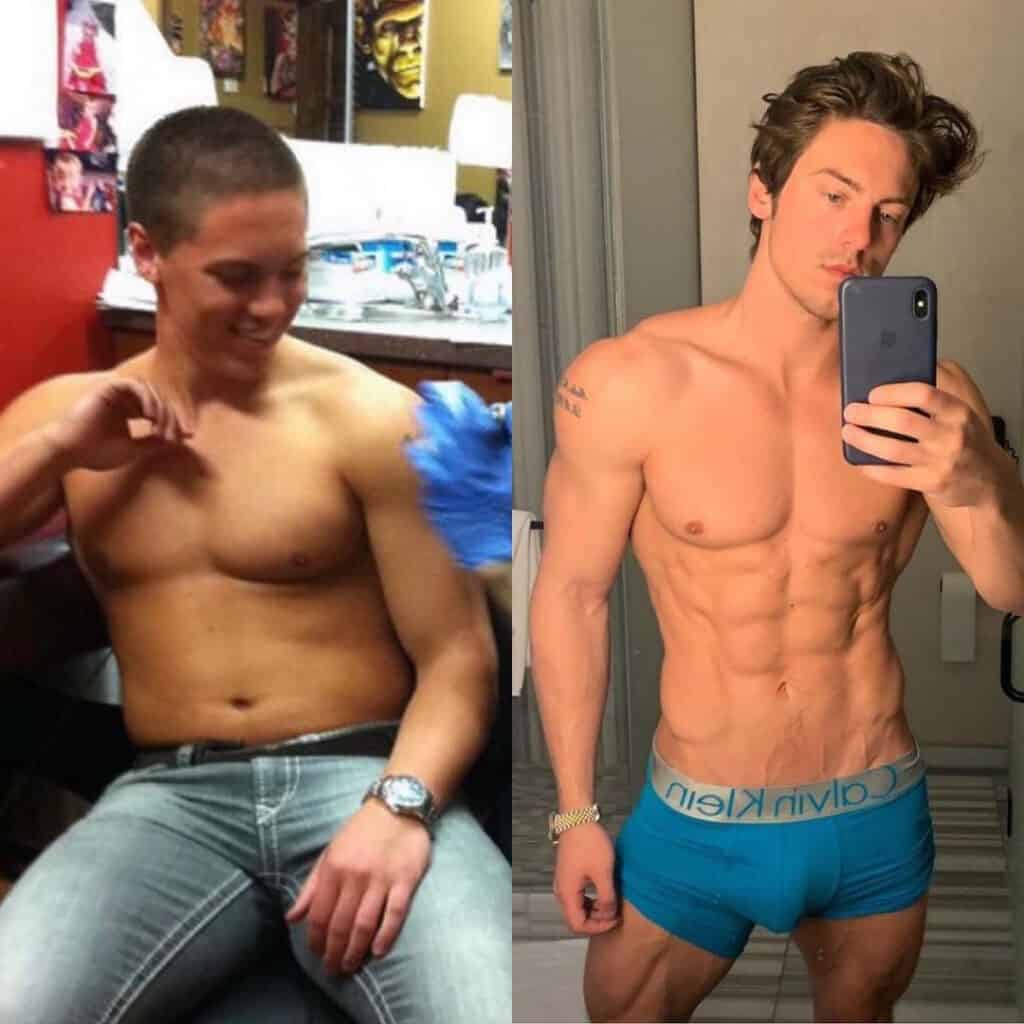After you watch the video, head over to www.ShreddingProgram.com to check out what’s coming up…
Now let’s talk about the BIG problem with most people’s nutrition when it comes to getting ripped:
The current mainstream nutrition wisdom is making it next to impossible to lose fat and get lean.
Instead of tracking our calorie intake to ensure that we’re eating at a deficit, we are told to only eat certain foods, to avoid eating after 8pm, to eat smaller meals (but more frequently). We are also told that if we decrease our calories or skip a meal our metabolism will crash and we’ll go into fat storing mode.
What’s funny is the amount of contradictions in the nutrition industry with so many different dietary approaches and with so many conflicting diet recommendations, it becomes impossible to know what to do.
The truth of the matter is that as far as fat loss is concerned, the only thing that actually matters is eating at a calorie deficit. Without a calorie deficit in place, your body will burn food energy for fuel. It’s only when you eat less calories than your body burns, that you are forced to burn your own body fat for fuel. Provided that you get in enough protein and engage in some form of strength training, you will maintain your muscle mass while dropping body fat.
What you must realize is that every single diet works behind the calorie deficit principle. Diet gurus and authors try to trick you into eating less calories by having you eliminate specific foods or by having you follow restricting diet rules. This may work at first but eventually you will get fed up following non-sensible diet rules. Alternatively, you’ll lose some fat but you’ll eventually hit a plateau.
This is because your body has adapted to whatever eating protocol you were following at the time. So at first by restricting carbs for example you cut your calorie intake by a considerable amount. But invariably, you’ll start to eat so much protein and fat that you will no longer be creating a calorie deficit. This will halt fat loss altogether! Therefore the only way to ensure continued fat loss is to track your calorie intake.
Now, even when people start to track their calories and eat at a deficit, I still see massive, self sabotaging mistakes. You see, when eating at a deficit, you want to make it as enjoyable and satisfying as possible that way, you will stick with it. Unfortunately, this is hardly the approach that most people take. Let’s run through some common mistakes that most people make.
Common Nutrition Mistakes
Mistake #1 – Going too low in calories
If you’re eating very low calories you’re going to feel miserable, your sex drive is going to tank and your workouts are going to suffer! Eventually you’re going to have enough and break your diet, undoing much of your progress.
For this reason I like to use modest deficits, 20% under maintenance works great. So if you burn 2500 calories per day, then you should eat around 2000 calories for fat loss. This is a comfortable deficit, provided that you eat lots of filling food.
Mistake #2 – Cutting out fat or carbs
I often see people going super low in fats or carbs when cutting. In fact, a recent trend is to go really low in fat on training days and really low in carbs on rest days. I am far from fond of this approach. Going low in fat makes it next to impossible to stay full, testosterone suffers and food tastes bland.
Would it not be more enjoyable to reduce carbs slightly and have a moderate amount of fat? As long as calorie and protein intake is matched, there will be no difference in fat loss or fat gain. A similar set of problems arise with low carb dieting. Carbs support strength training and when you cut carbs training suffers big time. Further, a diet low in carbs tends to make people restless and agitated. This is because carbs trigger the release of serotonin, this is what makes you feel relaxed, tired and happy.
The best approach seems to be a balance between protein, fats and carbs.
Mistake #3 – Eating Too Frequently
A huge trend in the fitness industry is the whole idea of eating smaller meals but more frequently. Look at any fitness models diet and you’ll see that they’re eating 6, 7 or even 9 meals per day. Who in God’s green goodness has the time to eat so many meals per day? That’s absurd!
If dieting feels like a full time job you will never stick with it. Eventually life will get in the way or you’ll feel overburdened and you’ll throw in the towel. This isn’t your fault. You’d have to be an obsessed food Nazi to prepare 5+ meals per day. If dieting ruins your life then why in heck would you stick with it? It’s not worth it.
I remember years ago I would struggle to stick to a diet eating 5 meals per day. I was constantly having cravings and thinking about food. Once I scrapped the frequent meal approach, and started intermittent fasting and eating 2 to 3 big meals per day, eating at a deficit became a walk in the park. I felt completely satisfied after eating and I was able to get so much more work done. I could also incorporate delicious meals while leaning down.
It’s very often that my clients will express doubt that they will actually get lean when they’re so full on a diet. I prove them wrong each and every time. You see, I focus on making dieting so simple and so satisfying that it becomes impossible not to succeed.
My Approach (That works time and time again…)
For me nutrition is about feeling incredible! I structure the diet to ensure that I feel absolutely fantastic. This is why I eat big meals and keep my macro nutrient intake balanced. I know that if I go too low in carbs or fat, I’ll feel miserable.
I also make nutrition super simple, I eat my favorite foods while fitting them into my macro numbers. I fast for 5-6 hours after rising and I usually eat two big meals per day plus one smaller meal. I frequently drink alcohol and incorporate pancakes and ice-cream into my diet, while getting leaner. I also don’t stress about hitting my macros exactly. The truth is that you can never be 100% precise, so don’t try to be.
I’m going to be breaking down exactly how to structure your diet and nutrition program for maximum effect (and fat loss) in my Kinobody Warrior Shredding Program… Click here for all the details!
[cbcpost]





